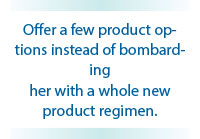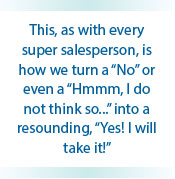Spa and salon experts agree: Retailing is critical to success and expertise in this area is often the missing X-factor. Developing retailing skills consists of several parts, the most essential of these being the brands which are represented in your skin care center, salon, or spa. Does the skin care brand you are carrying truly represent your company’s vision at its most inspiring? Hopefully the answer is yes!
 The next step is to familiarize yourself with every key feature and benefit of every product in the lines you support. Be sure that everyone on the team does the same. It is more than memorization and rote listing. The magic lies in really connecting to what the information means to customers. Getting – and keeping – a firm grip on the product intelligence means that you have powerful tools at your disposal for answering questions and, in the selling process, countering and overcoming any objections. This, as with every super salesperson, is how we turn a “No” or even a “Hmmm, I do not think so...” into a resounding, “Yes! I will take it!” If your spa carries more than one product line or if a new line has just been introduced, make the commitment to master this information and keep yourself fresh and current about why every SKU number on the shelf is great and unique. This information also empowers you to give the client what they deserve: prescriptive selling by matching specific product features to specific client needs.
The next step is to familiarize yourself with every key feature and benefit of every product in the lines you support. Be sure that everyone on the team does the same. It is more than memorization and rote listing. The magic lies in really connecting to what the information means to customers. Getting – and keeping – a firm grip on the product intelligence means that you have powerful tools at your disposal for answering questions and, in the selling process, countering and overcoming any objections. This, as with every super salesperson, is how we turn a “No” or even a “Hmmm, I do not think so...” into a resounding, “Yes! I will take it!” If your spa carries more than one product line or if a new line has just been introduced, make the commitment to master this information and keep yourself fresh and current about why every SKU number on the shelf is great and unique. This information also empowers you to give the client what they deserve: prescriptive selling by matching specific product features to specific client needs.
Simultaneous with always building and refining your product knowledge, develop a selling style that is compatible with the professional and discreet culture of your spa. Many skin care professionals, massage therapists, and others in our business shrink away from selling because they feel shy, lack confidence, or think selling to the customer will be offensive. But handled with respect, tact, and sensitivity, prescriptive selling of a home-care regimen actually adds value to professional treatments and builds a relationship of trust between you and your clients – which will benefit the client’s skin as well as your bottom line. You are the expert and should see yourself as a problem solver, not a salesperson. In order to provide exceptional service, it is your duty to educate clients on products, ingredients, and lifestyle choices to reach skin health goals. This mindset will take the intimidation out of suggesting take-home products and will optimize the client’s treatment results. Not only will the client love her results – but she will continue to return regularly to you for advice and recommendations.
It all starts with the greeting.
To avoid the reflexive “I am just looking” attitude from browsers, bypass the generic shopkeeper’s greeting and go straight for the connection. These greetings do not engage the client:
- May I help you?
- Do you have any questions?
- Are you looking for something in particular?
Instead, ask open-ended questions that cannot result in a flat “no” response. Greetings which invite more interaction, engagement, and connection might be:
- What would you change about your skin if you could?
- Do you have a skin care regimen that is currently working for you?
- How frequently do you exfoliate your skin? (Follow with: A lot of our clients find that when they exfoliate properly, their moisturizer works better. And, of course, their skin texture looks more refined.)
- How do you remove your makeup at the end of the day?
- Do you use a product with SPF every day?
- Do you like the results that your cleanser is giving you?
- Do you use a mask regularly? (Follow with: “A lot of our clients say that they do not really know how to use a mask, but these products can really deliver benefits deep into your skin and make a big difference! I would love to give you a free sample.”)
 Always open this initial exchange with something positive about their skin, but be sure it does not come off as just generic flattery. Try to isolate something specific that is a plus. This will not only make your soon-to-be client feel empowered, but will also establish you as an expert.
Always open this initial exchange with something positive about their skin, but be sure it does not come off as just generic flattery. Try to isolate something specific that is a plus. This will not only make your soon-to-be client feel empowered, but will also establish you as an expert.
If you encounter a defensive or indifferent client regardless of your approach, do not worry. This does not mean the client will not need help eventually or will not make a purchase.
One way to continue talking to customers after they say “just looking” is to say, “Great, and I want to let you know that with every product purchased today you will receive a deluxe sample of our microfoliant.” This will allow your client to know that you are trying to be helpful.
Present yourself as an expert authority.
Unlike beauty products and cosmetics, skin care products concern the health of the client. When you initiate your dialogue, explain that you are a licensed skin therapist and that it is your passion to help women achieve their healthiest skin at every age. Tell the client where you obtained your license and how many hours of study you have put into your credentials so far. Explain that optimum skin health requires teamwork and you would love to share your expertise to help the client enjoy radiant, supple skin that glows with health.
Be your brand.
First, establish yourself as a legitimate professional who is genuinely interested in the health and well-being of your client. Then, move the conversation to the brand which you represent. The client does not want to hear a drawn-out company history, but she will be moved if you can articulate the vision and mission of the brand in a few relevant phrases. Work with your team so that you can articulate the unique selling proposition of your brand in a few great sound bites. Like “Our company was started by an expectant mother who did not want to use products containing artificial colors or perfume on her hair or body.” or “Our brand was created for the woman who has no time to waste and wants to achieve results.”
Emphasize benefits, not features.
In a brief chat, customers do not especially care about a product’s ingredients — they care about the benefits of those ingredients. Learn and explain the positive effects of every ingredient, do not just prattle out the laundry list. For instance, say “This gentle scrub is made from powdered rice bran extract, so the product gently polishes the skin and is much less abrasive than scrubs made from apricot pits or other seeds.”
 Follow the leader.
Follow the leader.
We are social creatures and tend to imitate and follow others. Anything that is deemed popular can trigger clients to buy. Back up claims with evidence, testimonials, endorsements, or scientific data. Share with your client the story about a regular client who has become obsessed with this cleanser and buys three at a time. Clients love a good testimonial from their peers.
Display quotes from your clients on a product review. You can also display top sellers, or products voted best by celebrity makeup artists. Also display editorial and product reviews featured in magazines and newspapers throughout the space. Testimonials from editors can motivate clients to learn more about a service or product.
We are really excited to share some samples with you today!
Clients are 10 times more likely to purchase a beauty product after they have been sampled. Make sure you are not blind sampling or just tossing samples in a bag. Create value by personally handing them the sample like it is gold! Tell them all about the product’s features, benefits, and how to use it. They are more likely to try it out and come back to purchase it!
Gifts with purchases are a great tool to help you upsell. Maybe a client was coming in for one cleanser, but you present them with the opportunity to purchase one more item because you are offering a gift with purchase of $100 or more. It is a win-win for both you and your client. The client will feel great about receiving a reward for the purchase they just made… and most likely they will return to purchase full, retail-size versions of the samples included in the gift with purchases!
Engage the senses and the body.
Offer your client a seat. Once your client sits in a chair, whether it be at a skin bar for a skin analysis or on your treatment bed, the dialogue will feel more relaxed and comfortable. You now have her undivided attention and are able to look into her eyes and have a more meaningful interaction.
People often react to products based on aroma. Ideally, you are using products that do not contain synthetic fragrances, but are made from petroleum and may trigger allergy-like sensitization in the skin in the long run. If your products are unfragranced or derive their aromas only from essential oils and other botanicals, yay! — this is a powerful selling point to slip into the conversation.
Offer a few product options instead of bombarding her with a whole new product regimen. Clients will buy more if you narrow options down to a small but compelling selection. Be sure that your suggestions correspond to specific issues over which the client has expressed concern. For instance, melasma or hyperpigmentation, often appearing on the cheeks, jaw, and neckline, is a hot topic with most women. Suggest products which address her particular issues.
Subtly mirror the behavior of the person to whom you are selling. By discreetly mimicking your client, you will create a sense of empathy — just be sure that it is not too overt, or you will seem manipulative. You can mirror hand gestures, lean in when they do, and echo the speed or tone of their speech. On a neurolinguistic level, this will unconsciously persuade your client to connect with you and can trigger them to purchase more. Make sure you are subtle about it and delay a few seconds between the other person’s movements. Practice with team members at the weekly meeting so it does not seem like a bad cabaret act!
Follow up with personal touches.
Make sure to politely write down all of your clients’ contact information to be able to follow up with them. Maximize your down time to check in to see how your client’s skin is doing with their new regimen, and to personally invite them back into to your spa. It is very important to always write them a handwritten thank you card. This personal touch will make your client feel extra special and cement their loyalty for many visits to come.
 Erica Connor is the director of retail operations for the two Dermalogica flagship stores in Santa Monica, Calif. and SoHo, N.Y. Connor’s scope of responsibilities spans planning and executing retail sales strategy for the brand’s flagship spaces, as well as merchandising, hiring sales associates, and providing retail training for the global Dermalogica team. Connor holds a bachelor’s degree in communications from West Chester University of Pennsylvania and has specialized in communications. She joined the company in 2010 and is based out of Dermalogwica headquarters located in
Erica Connor is the director of retail operations for the two Dermalogica flagship stores in Santa Monica, Calif. and SoHo, N.Y. Connor’s scope of responsibilities spans planning and executing retail sales strategy for the brand’s flagship spaces, as well as merchandising, hiring sales associates, and providing retail training for the global Dermalogica team. Connor holds a bachelor’s degree in communications from West Chester University of Pennsylvania and has specialized in communications. She joined the company in 2010 and is based out of Dermalogwica headquarters located in
Carson, Calif.
Want to read more?
Subscribe to one of our monthly plans to continue reading this article.